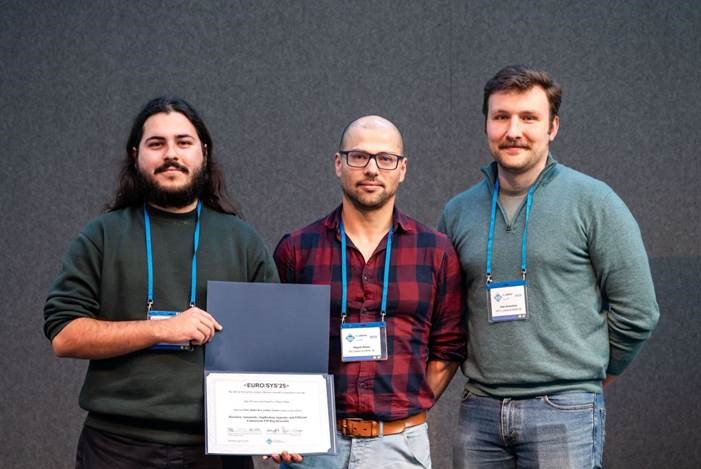EuroSys 2025, one of the most prestigious conferences in the field of computer systems, took place from March 30 to April 3 in Rotterdam, The Netherlands. The event gathered leading researchers and professionals from around the world to explore the latest innovations and challenges in systems software and advanced computing technologies.
Three researchers from the BIG project attended the conference, contributing significantly to the scientific community. Miguel Matos, from INESC-ID/IST, co-authored the paper “HawkSet: Automatic, Application-Agnostic, and Efficient Concurrent PM Bug Detection”, together with João Oliveira and João Gonçalves (also from INESC-ID/IST). Their work received the Gilles Muller Best Artefact Award, recognising the exceptional quality and impact of their research.
The paper introduces HawkSet, a novel tool for automatically detecting bugs in concurrent programs that use persistent memory — an emerging technology with applications in high-performance computing and blockchain systems. HawkSet uses lockset analysis and automatic binary instrumentation to detect subtle concurrency bugs, including several previously unknown issues. It outperforms state-of-the-art tools with speedups of up to 159× and does so without requiring application-specific knowledge or specialised debugging setups.
“The paper proposes a tool for detecting bugs in concurrent programs that use persistent memory. This is an emerging technology with diverse applications, particularly in high-performance systems and blockchains,” explained Miguel Matos.
Persistent memory, which enables fast and durable applications without relying on traditional disk-based I/O, was one of the key topics at EuroSys 2025. In addition to presenting the award-winning paper, Miguel Matos took part in several sessions focused on blockchain, persistent memory, fault-tolerant algorithms, and related themes, sharing his expertise and engaging with the broader research community.
Vaibhav Arora (INESC-ID/IST) also took part in the EuroSys Doctoral Workshop (EuroDW ’25), where he presented “Testing and comparing real-world blockchains under strain”, a research project developed in the context of his Ph.D. under the supervision of Rodrigo Rodrigues and Miguel Matos (INESC-ID/IST), both of whom also attended the event. His work addresses the gap between the formal correctness of Byzantine Fault Tolerant (BFT) consensus algorithms and the practical behaviour of their implementations under adverse conditions.
The BIG project’s participation and recognition at EuroSys 2025 reinforce the leadership of Portuguese researchers in the development of cutting-edge solutions for emerging technologies, further contributing to global scientific and technological progress.
Also featured in the IST Computer Science and Engineering Department news section and INESC-ID news section.
